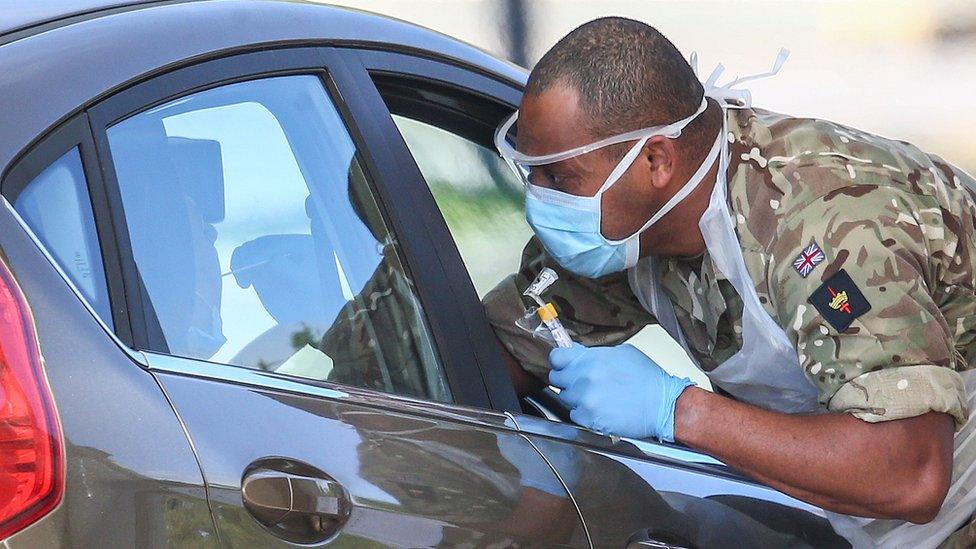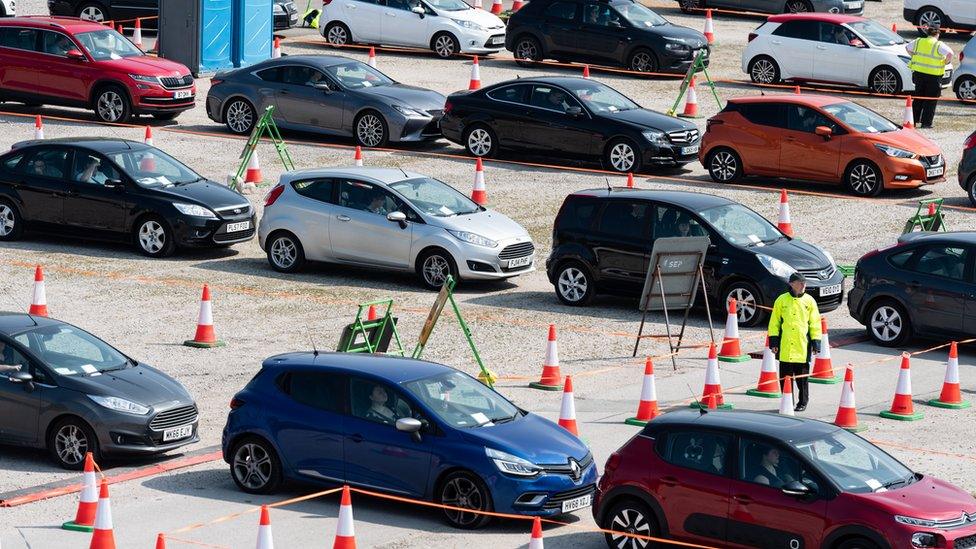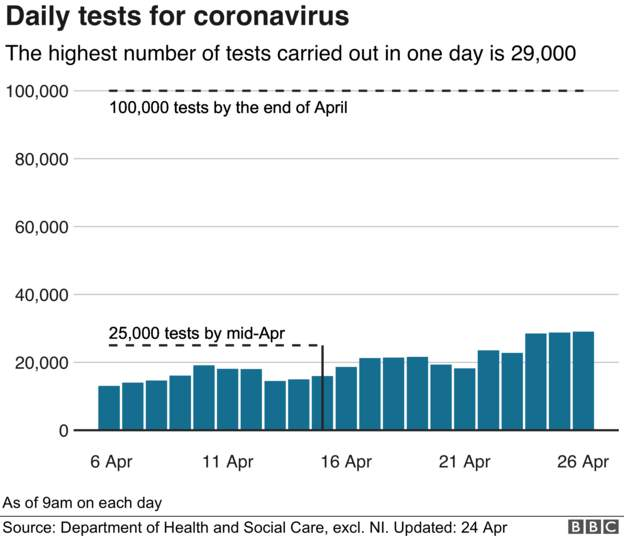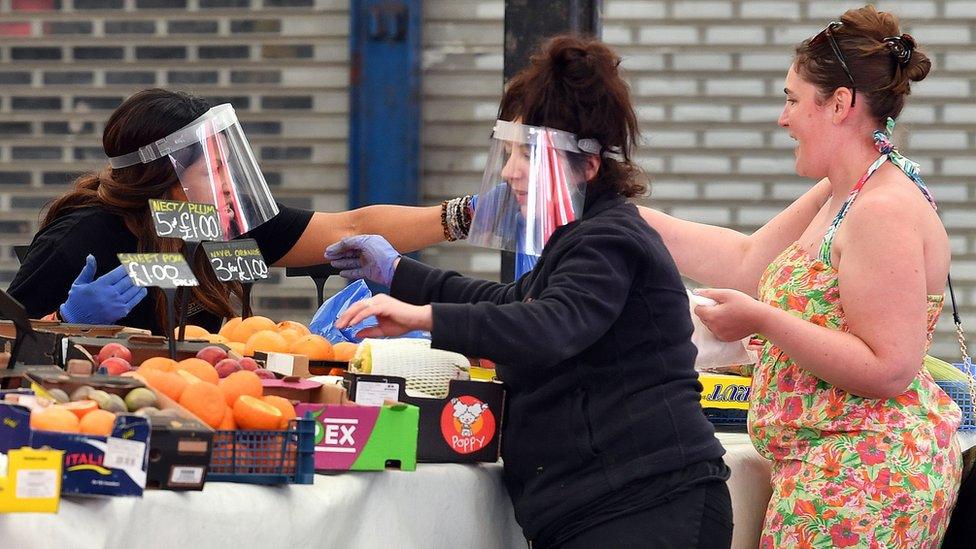Coronavirus: Military tests key workers in mobile units
- Published

The military has started testing essential workers in the UK for coronavirus in mobile units operating in "hard to reach" areas.
At least 96 new pop-up facilities, which will travel to care homes, police and fire stations, prisons and benefits centres, are planned in total.
Eleven of those mobile sites are up-and-running in areas including Salisbury, Carlisle and Watford.
It comes as the government aims to reach 100,000 tests a day by Thursday.
The latest figures released by the government reveal a running total of 20,732 deaths of people with coronavirus, not including those in English care homes, which are collated separately.
Are you a key worker trying to get a test? Email: haveyoursay@bbc.co.uk, external
There were 29,058 tests carried out on Saturday, an increase from the 28,760 tests carried out the day before, but still far short of the government's daily target of 100,000 - which it aims to achieve by the end of April.
Foreign Secretary Dominic Raab told BBC One's Andrew Marr Show the government has to "ramp testing right up" but added it was "on track" to hit its target.
"We have certainly got to get the daily testing right up to hundreds of thousands which, along with the tracking and tracing, gives us… more flexibility because we can open up measures, open up access," Mr Raab said.
"That, along with the vaccine and therapeutics will be the medium to long-term way of dealing with coronavirus sustainably and responsibly for good."

Drive-through testing facilities have been set up around the country
Some health and care workers have previously reported having to make long journeys to their nearest drive-through testing centres.
Many care homes have said none of their staff have been tested, while others have spoken of struggles to access official test centres after reporting online they have symptoms.
Of 210 care providers contacted by the BBC earlier this week, 159 said none of their workers had been tested.
Environment Secretary George Eustice said at the daily government press briefing that the capacity for testing has risen to more than 50,000 a day, adding that "significant numbers" of people in care homes are obtaining tests.

The new pop-up facilities, which can be set up in 20 minutes, see swabs collected by "specially trained" military personnel and taken to one of three "mega labs" to be processed, with results expected within 48 hours.
The number of units is being scaled up after a successful pilot last week. An extra 80 or so units, expected to be running by the start of May, will travel to areas where there was "significant demand", the government said.
The armed forces will staff 92 of the units, while civilian contractors will operate a further four located in Northern Ireland, the DHSC said.
And mobile units set up by the military to carry out tests at care homes will be in operation in Scotland by next week, the Scottish health secretary has said.
Jeane Freeman told the BBC's Sunday Politics Scotland: "We anticipate in the coming week we will have five of those and that is to be followed by a further eight."


The UK has come a long way on testing. When the first cases of coronavirus emerged, the government was reliant on eight Public Health England labs, which could carry out little more than 1,000 tests a day.
That then expanded to include hospital labs, before a network of drive-through testing centres was created - there are around 30, but they will increase to nearly 50 soon - supported by three mega-labs for processing tests.
The aim is to get to the target of 100,000 tests a day by the end of the month.
But as the range of people entitled to testing has increased, one of the issues has been ensuring it is available close to where people need it. A drive-through centre 30 miles from a care worker who does not have access to a car is of little use for example.
The pop-up testing centres run by the military, which are also coinciding with the development of home testing kits, are an attempt to remedy that and ensure the full testing capacity is used. Currently only around half the 50,000 available tests on any given day are being carried out.

Prof John Newton, who is co-ordinating coronavirus testing for the government, said the new mobile testing units would help achieve the goal of performing 100,000 tests a day by "providing tests to vital frontline workers wherever they need them".
He said efforts to increase capacity had resulted in "scores of new testing facilities and Britain's largest network of diagnostic labs in history".
Since Friday, millions of key workers and people they live with have been able to book appointments online to be tested. Those too ill to travel should also be able to order home kits - although numbers are limited.

A SIMPLE GUIDE: How do I protect myself?
AVOIDING CONTACT: The rules on self-isolation and exercise
LOOK-UP TOOL: Check cases in your area
VIDEO: The 20-second hand wash

On Sunday morning home kits were no longer available within 15 minutes of the site reopening at 08:00 BST.
Appointments to visit a test site in England ran out about seven hours after the website opened on Sunday, much later than in the previous two days. Slots became available again at about 20:00 BST.
Spaces remained available in Scotland throughout the day.
Key workers in Wales and Northern Ireland cannot currently book tests online. Both nations appear as options on the government's online system but with a label saying no slots are available.
The tests offered are swab tests that determine whether people currently have the virus - rather than whether they have had it in the past.
'I was impressed'
One of those who sought a test was Kevin Melia, who works as an NHS theatre support worker at Chester Hospital and has been self-isolating at home because he thinks he has Covid-19 symptoms.
He suffers from asthma and has a low immune system after having his leg amputated last year, he told the BBC.
Mr Melia, who lives in Liverpool, said he tried to book an appointment on Sunday, but was told the nearest centre was in Birmingham.
"It's around 100 miles from where I live, this was at 8:30 this morning. I think this is just outrageous," he said.
But Suzy Sard said for her, the process was "very well organised".
She booked a slot at a centre in Portsmouth after her ex-husband displayed symptoms and she and her children were advised to self-isolate.
"I jumped at the chance to take a test so that I could get back to normality," the teaching assistant from Basingstoke said.
"When we arrived it was very well organised and all the staff there had personal protective equipment.
"The whole process took just over an hour. The staff were very polite and I was impressed with the service, considering how quickly it has been set up."

Doctors' leaders say all key workers should wear face masks
The British Medical Association (BMA) has said testing for healthcare staff should not be allocated on a "first come, first served" basis.
BMA chairman Dr Chaand Nagpaul said the new booking system "offered no practical help" to healthcare workers, adding that about 90,000 health and care staff are self-isolating.
"There is no point putting forward a proposal unless its matched with adequate capacity," he said.
The BMA has also accused ministers of dragging their feet over calls for families of healthcare workers who lose their lives fighting coronavirus to be financially supported.
The government said it was currently considering the financial support for the families of those on the front line.
More than 100 healthcare workers have died with the virus so far, according to BBC analysis.
The BMA has also called for all key workers to be provided with face masks to combat the spread of the virus.

How have you been affected by coronavirus? Are you a key worker trying to get a test? Share your experiences by emailing haveyoursay@bbc.co.uk, external.
Please include a contact number if you are willing to speak to a BBC journalist. You can also contact us in the following ways:
WhatsApp: +44 7756 165803
Tweet: @BBC_HaveYourSay, external
Send pictures/video to yourpics@bbc.co.uk, external
Please read our terms & conditions and privacy policy